Unit 4 I used to be afraid of the dark. Section A 3a-3c 课件 人教版九年级英语全册(45张PPT)
文档属性
| 名称 | Unit 4 I used to be afraid of the dark. Section A 3a-3c 课件 人教版九年级英语全册(45张PPT) | 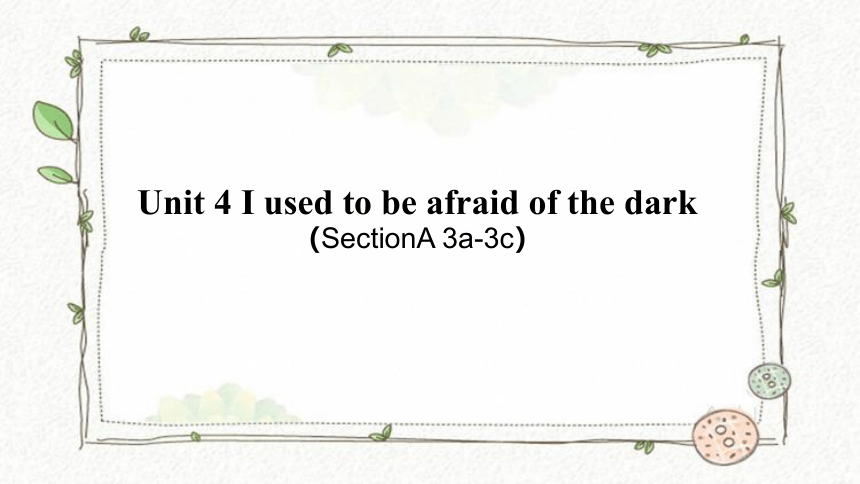 | |
| 格式 | pptx | ||
| 文件大小 | 867.6KB | ||
| 资源类型 | 教案 | ||
| 版本资源 | 人教新目标(Go for it)版 | ||
| 科目 | 英语 | ||
| 更新时间 | 2023-08-29 14:33:18 | ||
图片预览

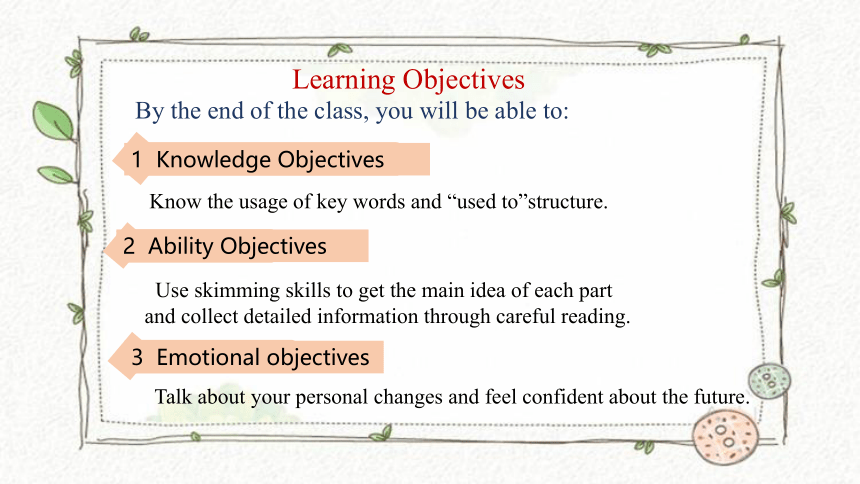
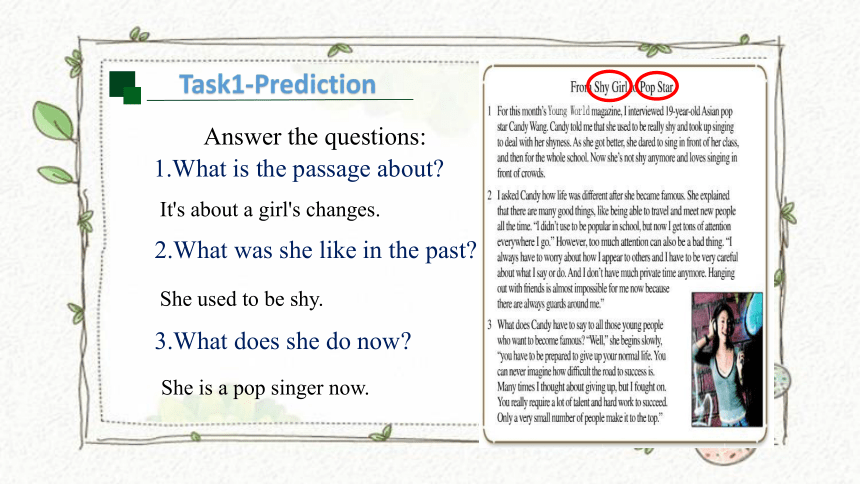
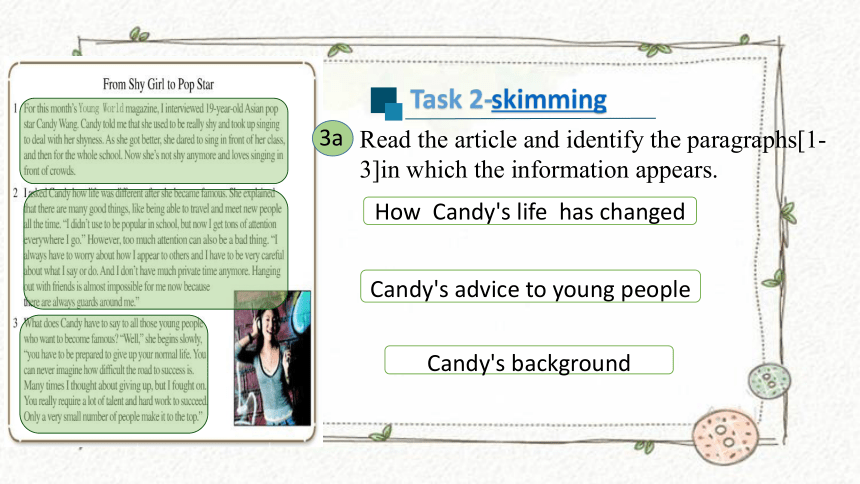


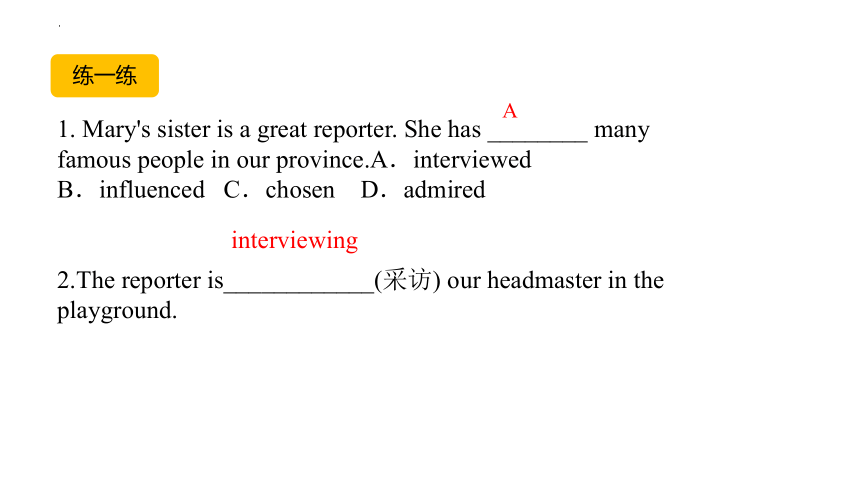
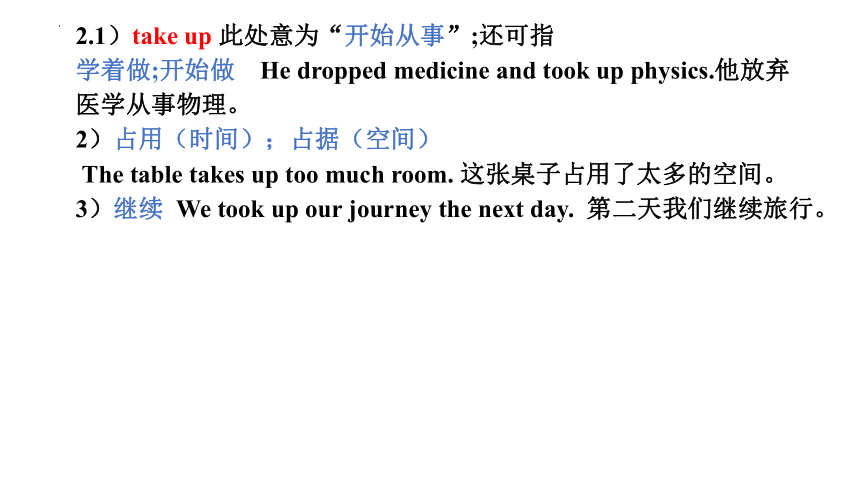
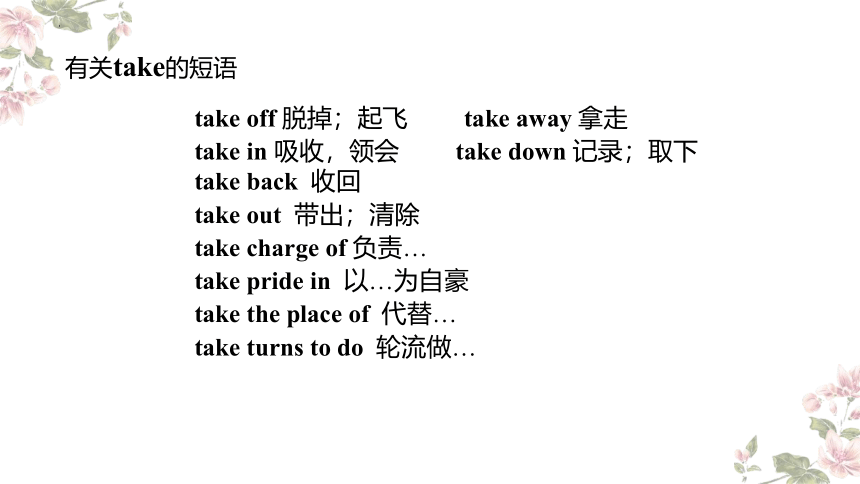
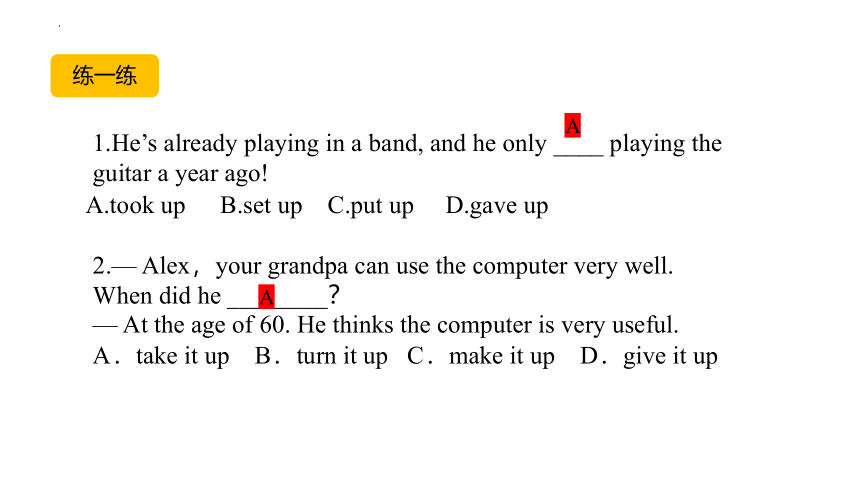
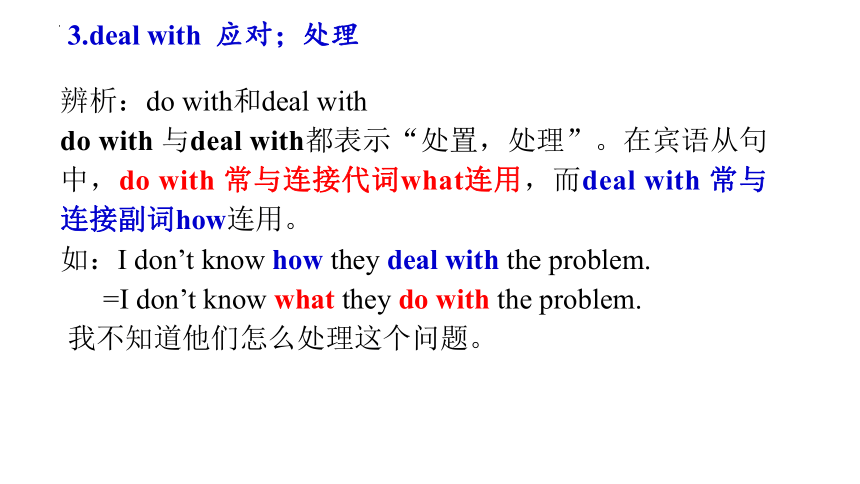
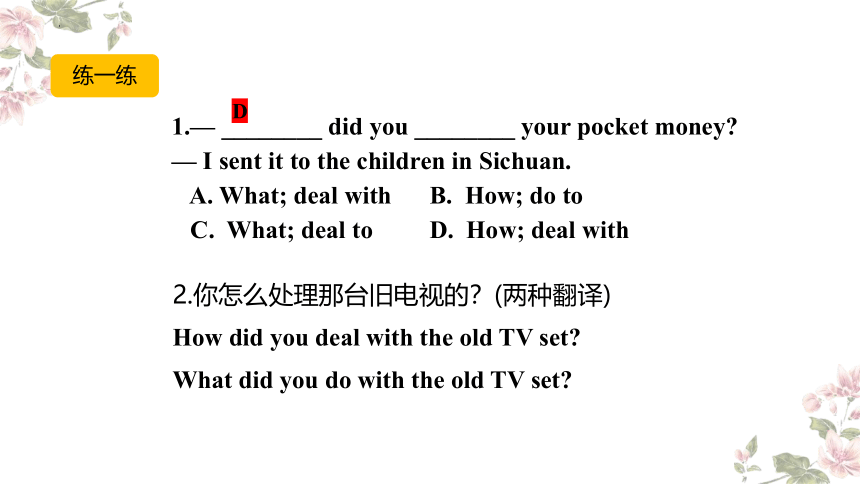
文档简介
(共45张PPT)
Unit 4 I used to be afraid of the dark
(SectionA 3a-3c)
Learning Objectives
By the end of the class, you will be able to:
Talk about your personal changes and feel confident about the future.
Use skimming skills to get the main idea of each part and collect detailed information through careful reading.
1 Knowledge Objectives
2 Ability Objectives
3 Emotional objectives
Know the usage of key words and “used to”structure.
Task1-Prediction
1.What is the passage about
2.What was she like in the past
3.What does she do now
It's about a girl's changes.
She used to be shy.
She is a pop singer now.
Answer the questions:
Task 2-skimming
Read the article and identify the paragraphs[1-3]in which the information appears.
How Candy's life has changed
Candy's advice to young people
Candy's background
3a
Read the Para1 carefully and answer.
1. How old is Candy Wang
She is 19 years old.
2. What does she do
She is an Asian pop star.
3. How did she deal with her shyness
She took up singing to deal with her shyness.
应对;处理
1.interview v. 采访;面试 n. 面试;访谈
interview的常用短语有:
interview sb. 采访某人
interview sb. about sth. 就某事采访某人
Language Points
练一练
1. Mary's sister is a great reporter. She has ________ many famous people in our province.A.interviewed B.influenced C.chosen D.admired
2.The reporter is____________(采访) our headmaster in the playground.
A
interviewing
2.1)take up 此处意为“开始从事”;还可指
学着做;开始做 He dropped medicine and took up physics.他放弃医学从事物理。
2)占用(时间);占据(空间)
The table takes up too much room. 这张桌子占用了太多的空间。
3)继续 We took up our journey the next day. 第二天我们继续旅行。
有关take的短语
take off 脱掉;起飞 take away 拿走
take in 吸收,领会 take down 记录;取下 take back 收回
take out 带出;清除
take charge of 负责…
take pride in 以…为自豪
take the place of 代替…
take turns to do 轮流做…
1.He’s already playing in a band, and he only ____ playing the guitar a year ago!
A.took up
B.set up C.put up D.gave up
2.— Alex,your grandpa can use the computer very well. When did he ________?
— At the age of 60. He thinks the computer is very useful.
A.take it up B.turn it up C.make it up D.give it up
练一练
A
A
3.deal with 应对;处理
辨析:do with和deal with
do with 与deal with都表示“处置,处理”。在宾语从句中,do with 常与连接代词what连用,而deal with 常与连接副词how连用。
如:I don’t know how they deal with the problem.
=I don’t know what they do with the problem.
我不知道他们怎么处理这个问题。
练一练
2.你怎么处理那台旧电视的?(两种翻译)
How did you deal with the old TV set
What did you do with the old TV set
1.— ________ did you ________ your pocket money
— I sent it to the children in Sichuan.
A. What; deal with B. How; do to
C. What; deal to D. How; deal with
D
4. shyness 名词,意为“害羞;腼腆”是形容词shy 加
后缀-ness 构成的名词。
拓展:sad -------- sadness happy-------- happiness
ill -------- illness kind -------- kindness
1. The little girl covered her face with her hands to hide her ________.(shy)
练一练
shyness
5. dare 此处用作及物动词,意为“敢于;胆敢”。常构成短语dare to do sth.意为“敢于做某事”。
He didn't dare to look at her in the eye. 他不敢直视她的眼睛。
1. The little girl was so afraid of the dog that she didn't dare ________ at all.A.to count B.to move C.counting D.moving
练一练
B
6.in front of和in the front of
in front of是指在某物的前方(在某个范围外),
in the front of是指在某物内部的前部(在某个范围内部)。
eg:There is a tree in front of the classroom. 教室的前面有一棵树。
There is a teacher’s desk in the front of the classroom.
教室的前面有一张桌子。
选词填空。
in front of, in the front of
1. Look! A woman is sitting _______ the car.
2. A man is standing _______ the car.
3. The teacher is _______ the classroom.
4. There is a big tree _______ the house.
练一练
in the front of
in front of
in the front of
in front of
7.whole 形容词,意为“整个的;全部的”,常用结构为
“限定词+ whole +单数名词”。all也有此意,但语序不同:all +限定词+可数名词单数,不可数名词或可数名词复数;
eg: all the city the whole city 整座城市 all the students 所有的学生
1.It took me a ____ day to repair the bike.
A.the whole B.whole C.all D.all the
2._____ students went to the library.
A.All the B.The whole C.The all D.Whole the
练一练
B
A
8. not anymore= no more 意为“不再”
He doesn't come late anymore. = He no more comes late. 他不再迟到了。
辨析:not ... anymore与not ... any longer not ... anymore = no more 一般修饰短暂性动词,表示数量和程度上的“不再”。
not ... any longer = no longer 一般修饰延续性动词,表示时间或距离上“不再延长”。
You can’t stay here any longer. 你不能再呆在这儿了。
Task 3-Careful reading
Answer the questions below:
1.Has Candy's life changed since she became famous
2.Does she think all the changes are good
Yes, it has.
No,she doesn't. There are both advantages and disadvantages.
Paragraph 2
Task 3-Careful reading
Paragraph 2
Advantages Disadvantages
1.She is able to travel and meet new people.
2.She gets tons of attention everywhere she goes.
1.She has to worry about how she appears to others.
2.She has to be careful about her words and deeds.
3.She has no privite time and can't hang out with friends.
1. tons of
很多的,大量的
tons of 是英语中一种夸张的表达方式,ton的本义为“吨”。后接可数名词复数或不可数名词
He has been late for school tons of times.
他上学屡次迟到。
2. get…attention of
得到/引起…注意
He tried to get the attention of a passing policeman.
他试图引起一位路过的警察的注意。
3.However, too much attention can also be a bad thing.
辨析:too much,too many与much too
too much 太多的 相当于形容词,修饰不可数名词
太多 相当于副词,在句中作状语
too many 太多的 修饰可数名词复数
much too 太;非常 修饰形容词或副词
eg: There is too much noise in the classroom.教室里有太多的噪音。
She talked too much. 她说话说得太多。
She has too many emails to deal with today. 她今天有太多的邮件要处理。
The book is much too dear. 这本书太贵了。
1.You must drive slowly. There is _____ snow on the road.
A.too many B.too much C.much too D.many too
2.--- You shouldn’t eat ______ meat because it’s bad for your health.
--- Thanks. And eating a lot will make me look _______ fat.
A.much too B.too much C.many too D.too many
3.The sweater is very beautiful, but it’s _____dear.
A.too much B.much too C.many D.more
练一练
B
B
A
B
4. And I don’t have much private time anymore.
private adj.“私人的;秘密的”,其同义词为personal。
e.g. It’s wrong to read people’s private letters without permission.
未经允许阅读别人的私人信件是不对的。
We can talk about this matter in private.
我们可以私下谈论这件事。
5. Hanging out with friends is almost impossible for me now
because there are always guards around me.
这句话用到了动名词短语作主语,谓语用单数。动名词(短语)作主语多用来表示泛指或习惯的动作。
e.g. Smoking is not good for health.
吸烟对健康没有好处。
hang out “(和某人)在一起;闲逛”,其过去式和过去分词均为hung。
e.g. He spent a couple of days hanging out with his old friends.
他和几个老朋友待了两天。
1.we throw _____ rubbish every year.
A.tons of B.ton C.ton of D.a ton of
2.The president is paying a _________(私人的)visit to Europe.
3.---Students’ life shouldn’t just be about grades.
Free time activities like sports and _____ with friends are important,too.
----I think so.
A.hanging out B.giving out C.handing out D.taking out
4.When I tried to enter the building,a ___________(守卫) stopped me.
练一练
A
private
A
guard
Task 3-Careful reading
Candy gave some _______ to young people who want to be famous.
1.You have to be _______ to give up your _____ life.
2.You can never ______ how difficult the road to ______ is.
_______ Candy thought about giving up many times, she kept ______ on.
3.You _____ a lot of talent and hard work to ______.The number of people
who can make it to the top is ____.
advice
prepared
normal
imagine
success
Although
fighting
require
succeed
small
Paragraph 3
1. prepared
adj. 准备好的,愿意的
Hope for the best but be prepared for the worst.
抱乐观的希望,作最坏的准备。
be prepared to do =be ready to do 准备好做某事
Prepare 的用法
prepare to do sth. 准备做某事
prepare for sth 为某事做准备
prepare sth. for sb. 为某人准备某物
2.You can never imagine how difficult the road to success is.
the road to success “通向成功的路”,其中to是介词,后面跟名词或v.-ing形式。
the road to sth.是英语的一种固定表达方式,此处road并非指真实的“道路”,属于修辞手法,意指“途径;通道”。它可以独立使用,承担句子的主语、宾语等。
3. give up
放弃
give up doing 或名词。
I wish I could give up drinking.
我真希望自己能戒酒。
give up是动副短语, 如果宾语是名词, 既可以将其放在give与up的中间, 也可以放在give up的后面。
We won’t give up this project. = We won’t give this project up.
我们不会放弃这项工程。
如果宾语是代词, 则必须将其放在give与up之间。
Don’t give him up. 不要放弃他。
有关give的短语
give out 分发, 散发
give way 撤退, 让路
give over 交出,移交
give away 赠送,送出
give in 屈服,投降
give back 归还,送回
give off 散发(光、气味等)
4.Many times I thought about giving up, but I fought on.
fight (fought, fought) 努力去做,尝试
战斗,搏斗;争取
fight on 奋力坚持
eg: We must fight on until the end of the battle.
我们必须坚持到战斗结束。
拓展:(1)fight(against/with sb./sth.)与……搏斗,打架,作战
eg:Have you fought with your brother again?你又和弟弟打架了吗?
(2)fight(about/over sth.)因为某事而争论,争夺
eg:Don’t fight about small things.不要为琐事争吵。
(3)fight for sth.争取获得或完成某事
eg:The people fight for freedom,independence and human rights. 人们争取获得自由,独立,人权
练一练
用fight for,fight with,fight about,fight against填空
1.Two dogs _________ a bone,and a third runs away with it.
2.They are __________ better working conditions.
3.He often ___________ his sister in the past.
4.They_________ Italians in the last war.
5.Have you___________ your twin sister again
6.Don’t ___________ small things.
fight for
fighting for
fought with
fought against
fought with
fight about
5.You really require a lot of talent and hard work to succeed.
require意为“需要”时,
(1) sth. require +V-ing 某物需要被……
(2) require sb. to do sth. = require + that从句 要求某人做某事
eg:The chair requires repairing. 这个椅子需要被修理。
The court required him to pay the fine. 法院要求他支付罚款。
(=The court required that he should pay the fine.)
练一练
1.Don’t ____our hopes. As long as we pull together ,we will make it.
A.give up B.give out C.give back D.give away
2. ________ the teachers in their school is about 200 and ________ them are women teachers.
A.A number of;the number of B.A number of;a number ofC.The number of;a number of D.The number of;the number of
3.-He got the first prize in his math contest.
--Yes, I wondered how he did ____________.
A.make to it B.make successes C.make to D.make it
4.用prepare和prepare for填空
(1)When I came into the kitchen my mother ________ lunch.
(2)The final exam is coming.The students are trying to ________ it.
A
C
D
was preparing
prepare for
6.Only a very small number of people make it to the top.
a number of 许多,大量的 ....... 后接可数名词复数,做主语时,谓语动词用复数形式。
the number of .......的数量,后接可数名词复数,做主语时,谓语动词用单数形式
eg: A number of apples are red. 许多苹果是红色的。
The number of students is 2000. 学生的数量是2000。
练一练
1.______ of our workers is 800, and ______ of them are women.
A.A number; a number B.The number; the number
C.A number; the number D.The number; a number.
2.Look! There________ playing with the tourists on Yinhe Squre.
A.are a number of deer B.are a number of deers
C.is a number of deer D.is a number of deers
3.The head teacher asked_______ boys to clean the meeting hall.
A.a number B.the number C.a number of D.the number of
4.The number of pages in this book_______ three hundred.
A.is B.are C.has D.have
D
C
D
A
6. make it
make it 在口语当中相当于 succeed,表示“成功、做到、说定、赶上、及时到达”。
I will never make it to a morning class.
早上的课程我总是来不及去上。
I wondered if I would make it to the other side.
我怀疑自己是否能跑到对面。
3b
Read the article again and complete the sentences about Candy.
1.She used to be shy,but now she's not shy ________.
2.She didn't use to be _______ in school, but now she gets lots of attention.
3.She used to _________ with friends,but it is almost impossible now.
4.She didn't use to ___________ how she appears to others,but now she does.
any more
popular
hang out
worry about
Complete the sentences with the correct forms of the new words from the text.
1.There were some ________(Asia) leaders at the meeting.
2.Napoleon _________(requirement) every soldier to obey his orders.
3.She used to be shy, but now she _________(dare) to sing in front of the class.
4.____________(deal with) such problems is quite difficult for him.
5.They ____________(interviewer) some people who survived from the
earthquake yesterday.
Asian
required
dares
Dealing with
interviewed
1) Read the article again and retell it.
2) List your personal changes and how you feel about the changes.
Homework
THANK YOU
Unit 4 I used to be afraid of the dark
(SectionA 3a-3c)
Learning Objectives
By the end of the class, you will be able to:
Talk about your personal changes and feel confident about the future.
Use skimming skills to get the main idea of each part and collect detailed information through careful reading.
1 Knowledge Objectives
2 Ability Objectives
3 Emotional objectives
Know the usage of key words and “used to”structure.
Task1-Prediction
1.What is the passage about
2.What was she like in the past
3.What does she do now
It's about a girl's changes.
She used to be shy.
She is a pop singer now.
Answer the questions:
Task 2-skimming
Read the article and identify the paragraphs[1-3]in which the information appears.
How Candy's life has changed
Candy's advice to young people
Candy's background
3a
Read the Para1 carefully and answer.
1. How old is Candy Wang
She is 19 years old.
2. What does she do
She is an Asian pop star.
3. How did she deal with her shyness
She took up singing to deal with her shyness.
应对;处理
1.interview v. 采访;面试 n. 面试;访谈
interview的常用短语有:
interview sb. 采访某人
interview sb. about sth. 就某事采访某人
Language Points
练一练
1. Mary's sister is a great reporter. She has ________ many famous people in our province.A.interviewed B.influenced C.chosen D.admired
2.The reporter is____________(采访) our headmaster in the playground.
A
interviewing
2.1)take up 此处意为“开始从事”;还可指
学着做;开始做 He dropped medicine and took up physics.他放弃医学从事物理。
2)占用(时间);占据(空间)
The table takes up too much room. 这张桌子占用了太多的空间。
3)继续 We took up our journey the next day. 第二天我们继续旅行。
有关take的短语
take off 脱掉;起飞 take away 拿走
take in 吸收,领会 take down 记录;取下 take back 收回
take out 带出;清除
take charge of 负责…
take pride in 以…为自豪
take the place of 代替…
take turns to do 轮流做…
1.He’s already playing in a band, and he only ____ playing the guitar a year ago!
A.took up
B.set up C.put up D.gave up
2.— Alex,your grandpa can use the computer very well. When did he ________?
— At the age of 60. He thinks the computer is very useful.
A.take it up B.turn it up C.make it up D.give it up
练一练
A
A
3.deal with 应对;处理
辨析:do with和deal with
do with 与deal with都表示“处置,处理”。在宾语从句中,do with 常与连接代词what连用,而deal with 常与连接副词how连用。
如:I don’t know how they deal with the problem.
=I don’t know what they do with the problem.
我不知道他们怎么处理这个问题。
练一练
2.你怎么处理那台旧电视的?(两种翻译)
How did you deal with the old TV set
What did you do with the old TV set
1.— ________ did you ________ your pocket money
— I sent it to the children in Sichuan.
A. What; deal with B. How; do to
C. What; deal to D. How; deal with
D
4. shyness 名词,意为“害羞;腼腆”是形容词shy 加
后缀-ness 构成的名词。
拓展:sad -------- sadness happy-------- happiness
ill -------- illness kind -------- kindness
1. The little girl covered her face with her hands to hide her ________.(shy)
练一练
shyness
5. dare 此处用作及物动词,意为“敢于;胆敢”。常构成短语dare to do sth.意为“敢于做某事”。
He didn't dare to look at her in the eye. 他不敢直视她的眼睛。
1. The little girl was so afraid of the dog that she didn't dare ________ at all.A.to count B.to move C.counting D.moving
练一练
B
6.in front of和in the front of
in front of是指在某物的前方(在某个范围外),
in the front of是指在某物内部的前部(在某个范围内部)。
eg:There is a tree in front of the classroom. 教室的前面有一棵树。
There is a teacher’s desk in the front of the classroom.
教室的前面有一张桌子。
选词填空。
in front of, in the front of
1. Look! A woman is sitting _______ the car.
2. A man is standing _______ the car.
3. The teacher is _______ the classroom.
4. There is a big tree _______ the house.
练一练
in the front of
in front of
in the front of
in front of
7.whole 形容词,意为“整个的;全部的”,常用结构为
“限定词+ whole +单数名词”。all也有此意,但语序不同:all +限定词+可数名词单数,不可数名词或可数名词复数;
eg: all the city the whole city 整座城市 all the students 所有的学生
1.It took me a ____ day to repair the bike.
A.the whole B.whole C.all D.all the
2._____ students went to the library.
A.All the B.The whole C.The all D.Whole the
练一练
B
A
8. not anymore= no more 意为“不再”
He doesn't come late anymore. = He no more comes late. 他不再迟到了。
辨析:not ... anymore与not ... any longer not ... anymore = no more 一般修饰短暂性动词,表示数量和程度上的“不再”。
not ... any longer = no longer 一般修饰延续性动词,表示时间或距离上“不再延长”。
You can’t stay here any longer. 你不能再呆在这儿了。
Task 3-Careful reading
Answer the questions below:
1.Has Candy's life changed since she became famous
2.Does she think all the changes are good
Yes, it has.
No,she doesn't. There are both advantages and disadvantages.
Paragraph 2
Task 3-Careful reading
Paragraph 2
Advantages Disadvantages
1.She is able to travel and meet new people.
2.She gets tons of attention everywhere she goes.
1.She has to worry about how she appears to others.
2.She has to be careful about her words and deeds.
3.She has no privite time and can't hang out with friends.
1. tons of
很多的,大量的
tons of 是英语中一种夸张的表达方式,ton的本义为“吨”。后接可数名词复数或不可数名词
He has been late for school tons of times.
他上学屡次迟到。
2. get…attention of
得到/引起…注意
He tried to get the attention of a passing policeman.
他试图引起一位路过的警察的注意。
3.However, too much attention can also be a bad thing.
辨析:too much,too many与much too
too much 太多的 相当于形容词,修饰不可数名词
太多 相当于副词,在句中作状语
too many 太多的 修饰可数名词复数
much too 太;非常 修饰形容词或副词
eg: There is too much noise in the classroom.教室里有太多的噪音。
She talked too much. 她说话说得太多。
She has too many emails to deal with today. 她今天有太多的邮件要处理。
The book is much too dear. 这本书太贵了。
1.You must drive slowly. There is _____ snow on the road.
A.too many B.too much C.much too D.many too
2.--- You shouldn’t eat ______ meat because it’s bad for your health.
--- Thanks. And eating a lot will make me look _______ fat.
A.much too B.too much C.many too D.too many
3.The sweater is very beautiful, but it’s _____dear.
A.too much B.much too C.many D.more
练一练
B
B
A
B
4. And I don’t have much private time anymore.
private adj.“私人的;秘密的”,其同义词为personal。
e.g. It’s wrong to read people’s private letters without permission.
未经允许阅读别人的私人信件是不对的。
We can talk about this matter in private.
我们可以私下谈论这件事。
5. Hanging out with friends is almost impossible for me now
because there are always guards around me.
这句话用到了动名词短语作主语,谓语用单数。动名词(短语)作主语多用来表示泛指或习惯的动作。
e.g. Smoking is not good for health.
吸烟对健康没有好处。
hang out “(和某人)在一起;闲逛”,其过去式和过去分词均为hung。
e.g. He spent a couple of days hanging out with his old friends.
他和几个老朋友待了两天。
1.we throw _____ rubbish every year.
A.tons of B.ton C.ton of D.a ton of
2.The president is paying a _________(私人的)visit to Europe.
3.---Students’ life shouldn’t just be about grades.
Free time activities like sports and _____ with friends are important,too.
----I think so.
A.hanging out B.giving out C.handing out D.taking out
4.When I tried to enter the building,a ___________(守卫) stopped me.
练一练
A
private
A
guard
Task 3-Careful reading
Candy gave some _______ to young people who want to be famous.
1.You have to be _______ to give up your _____ life.
2.You can never ______ how difficult the road to ______ is.
_______ Candy thought about giving up many times, she kept ______ on.
3.You _____ a lot of talent and hard work to ______.The number of people
who can make it to the top is ____.
advice
prepared
normal
imagine
success
Although
fighting
require
succeed
small
Paragraph 3
1. prepared
adj. 准备好的,愿意的
Hope for the best but be prepared for the worst.
抱乐观的希望,作最坏的准备。
be prepared to do =be ready to do 准备好做某事
Prepare 的用法
prepare to do sth. 准备做某事
prepare for sth 为某事做准备
prepare sth. for sb. 为某人准备某物
2.You can never imagine how difficult the road to success is.
the road to success “通向成功的路”,其中to是介词,后面跟名词或v.-ing形式。
the road to sth.是英语的一种固定表达方式,此处road并非指真实的“道路”,属于修辞手法,意指“途径;通道”。它可以独立使用,承担句子的主语、宾语等。
3. give up
放弃
give up doing 或名词。
I wish I could give up drinking.
我真希望自己能戒酒。
give up是动副短语, 如果宾语是名词, 既可以将其放在give与up的中间, 也可以放在give up的后面。
We won’t give up this project. = We won’t give this project up.
我们不会放弃这项工程。
如果宾语是代词, 则必须将其放在give与up之间。
Don’t give him up. 不要放弃他。
有关give的短语
give out 分发, 散发
give way 撤退, 让路
give over 交出,移交
give away 赠送,送出
give in 屈服,投降
give back 归还,送回
give off 散发(光、气味等)
4.Many times I thought about giving up, but I fought on.
fight (fought, fought) 努力去做,尝试
战斗,搏斗;争取
fight on 奋力坚持
eg: We must fight on until the end of the battle.
我们必须坚持到战斗结束。
拓展:(1)fight(against/with sb./sth.)与……搏斗,打架,作战
eg:Have you fought with your brother again?你又和弟弟打架了吗?
(2)fight(about/over sth.)因为某事而争论,争夺
eg:Don’t fight about small things.不要为琐事争吵。
(3)fight for sth.争取获得或完成某事
eg:The people fight for freedom,independence and human rights. 人们争取获得自由,独立,人权
练一练
用fight for,fight with,fight about,fight against填空
1.Two dogs _________ a bone,and a third runs away with it.
2.They are __________ better working conditions.
3.He often ___________ his sister in the past.
4.They_________ Italians in the last war.
5.Have you___________ your twin sister again
6.Don’t ___________ small things.
fight for
fighting for
fought with
fought against
fought with
fight about
5.You really require a lot of talent and hard work to succeed.
require意为“需要”时,
(1) sth. require +V-ing 某物需要被……
(2) require sb. to do sth. = require + that从句 要求某人做某事
eg:The chair requires repairing. 这个椅子需要被修理。
The court required him to pay the fine. 法院要求他支付罚款。
(=The court required that he should pay the fine.)
练一练
1.Don’t ____our hopes. As long as we pull together ,we will make it.
A.give up B.give out C.give back D.give away
2. ________ the teachers in their school is about 200 and ________ them are women teachers.
A.A number of;the number of B.A number of;a number ofC.The number of;a number of D.The number of;the number of
3.-He got the first prize in his math contest.
--Yes, I wondered how he did ____________.
A.make to it B.make successes C.make to D.make it
4.用prepare和prepare for填空
(1)When I came into the kitchen my mother ________ lunch.
(2)The final exam is coming.The students are trying to ________ it.
A
C
D
was preparing
prepare for
6.Only a very small number of people make it to the top.
a number of 许多,大量的 ....... 后接可数名词复数,做主语时,谓语动词用复数形式。
the number of .......的数量,后接可数名词复数,做主语时,谓语动词用单数形式
eg: A number of apples are red. 许多苹果是红色的。
The number of students is 2000. 学生的数量是2000。
练一练
1.______ of our workers is 800, and ______ of them are women.
A.A number; a number B.The number; the number
C.A number; the number D.The number; a number.
2.Look! There________ playing with the tourists on Yinhe Squre.
A.are a number of deer B.are a number of deers
C.is a number of deer D.is a number of deers
3.The head teacher asked_______ boys to clean the meeting hall.
A.a number B.the number C.a number of D.the number of
4.The number of pages in this book_______ three hundred.
A.is B.are C.has D.have
D
C
D
A
6. make it
make it 在口语当中相当于 succeed,表示“成功、做到、说定、赶上、及时到达”。
I will never make it to a morning class.
早上的课程我总是来不及去上。
I wondered if I would make it to the other side.
我怀疑自己是否能跑到对面。
3b
Read the article again and complete the sentences about Candy.
1.She used to be shy,but now she's not shy ________.
2.She didn't use to be _______ in school, but now she gets lots of attention.
3.She used to _________ with friends,but it is almost impossible now.
4.She didn't use to ___________ how she appears to others,but now she does.
any more
popular
hang out
worry about
Complete the sentences with the correct forms of the new words from the text.
1.There were some ________(Asia) leaders at the meeting.
2.Napoleon _________(requirement) every soldier to obey his orders.
3.She used to be shy, but now she _________(dare) to sing in front of the class.
4.____________(deal with) such problems is quite difficult for him.
5.They ____________(interviewer) some people who survived from the
earthquake yesterday.
Asian
required
dares
Dealing with
interviewed
1) Read the article again and retell it.
2) List your personal changes and how you feel about the changes.
Homework
THANK YOU
同课章节目录
- Unit 1 How can we become good learners.
- Section A
- Section B
- Unit 2 I think that mooncakes are delicious!
- Section A
- Section B
- Unit 3 Could you please tell me where the restroom
- Section A
- Section B
- Unit 4 I used to be afraid of the dark.
- Section A
- Section B
- Unit 5 What are the shirts made of?
- Section A
- Section B
- Review of Units 1-5
- Unit 6 When was it invented?
- Section A
- Section B
- Unit 7 Teenagers should be allowed to choose their
- Section A
- Section B
- Unit 8 It must belong to Carla.
- Section A
- Section B
- Unit 9 I like music that I can dance to.
- Section A
- Section B
- Unit 10 You're supposed to shake hands.
- Section A
- Section B
- Review of Units 6-10
- Unit 11 Sad movies make me cry.
- Section A
- Section B
- Unit 12 Life is full of the unexpected
- Section A
- Section B
- Unit 13 We're trying to save the earth!
- Section A
- Section B
- Unit 14 I remember meeting all of you in Grade 7.
- Section A
- Section B
- Review of Units 11-14
